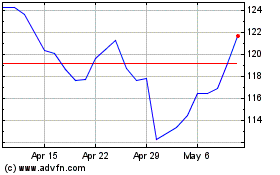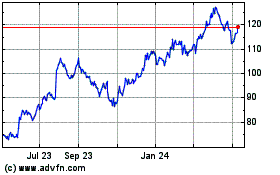Defense Companies Feel Oil's Knock
January 28 2016 - 11:44PM
Dow Jones News
By Doug Cameron
The first signs are emerging that falling commodity prices are
starting to hurt U.S. defense exports, as companies deal with
varying levels of demand for equipment, especially in the Middle
East.
L-3 Communications Holdings Inc. and Oshkosh Corp. said they are
facing tougher business conditions in the Middle East, with budget
pressures from falling oil revenues leading government customers to
push back on signing off on contracts on trucks and
communication-related equipments.
On the other hand, Raytheon Co., and its counterparts at
Lockheed Martin Corp. and Northrop Grumman Corp., say they have
seen strong demand from the region.
Analysts suggest that this reflected some changing priorities
among overseas buyers, with a focus on boosting air defenses and
munitions stockpiles.
The Middle East is the largest export market for U.S. defense
companies, which have been selling billions of dollars in combat
aircraft, missile defense systems and other equipment to the
region.
"The Mid-East has slowed down, and Australia as well," said L-3
Chief Executive Michael Strianese on an investor call, adding that
demand has strengthened in other parts of Asia.
Oshkosh, a big maker of mine-resistant military trucks, said a
hoped-for deal to sell hundreds of its M-ATV armored vehicles to a
Middle East nation failed to materialize last quarter, forcing the
company to trim its 2016 guidance.
Wilson Jones, the company's chief executive, said on an investor
call that he learned the unnamed customer had frozen its budget
last quarter, and was reviewing its spending plans.
Mr. Jones, who recently visited the region, said he remained
confident of completing the deal at some point.
Oshkosh, previously, has sold hundreds of the trucks, which
analysts said was its most profitable product, to the United Arab
Emirates.
Defense export sales are notoriously lumpy, and negotiations can
take far longer to complete than domestic deals as customers
wrangle over work-sharing, technology transfer and pricing.
U.S. companies have invested heavily to boost exports, in part
to counter a decline in Pentagon spending that only now is starting
to recover.
Exports account for a fifth of the total revenue across the
largest contractors.
Many of these companies have set up local bases and partnerships
with local companies to split the work and to win more deals.
Other defense executives this week said such efforts were
bearing fruit, with overseas sales continuing to expand, even
though U.S. products have become relatively more expensive as the
dollar strengthened.
"If anything, we're seeing a stronger demand than a slowdown,"
Raytheon's Chief Executive Tom Kennedy told investors Thursday,
after returning from a recent trip to the Middle East.
Raytheon derived 31% of its sales last year from overseas, the
highest proportion among big U.S. contractors, as countries look to
acquire its Patriot air defense system and Paveway laser-guided
bombs.
"There's probably been some re-prioritization," said Rob
Stallard at RBC Capital. "It doesn't mean the projects that have
been moved down the list are toast--it just means they'll take
longer."
Write to Doug Cameron at doug.cameron@wsj.com
(END) Dow Jones Newswires
January 28, 2016 23:29 ET (04:29 GMT)
Copyright (c) 2016 Dow Jones & Company, Inc.
Oshkosh (NYSE:OSK)
Historical Stock Chart
From Mar 2024 to Apr 2024

Oshkosh (NYSE:OSK)
Historical Stock Chart
From Apr 2023 to Apr 2024
